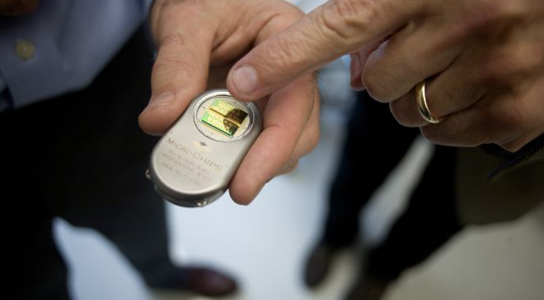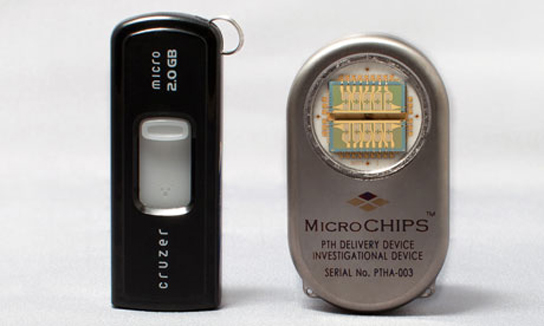
Credit: MicroCHIPS
Researchers have announced that a wirelessly-programmed implant, which has been successfully tested in human trials, could save patients the pain of daily injections.
The trials were run on seven Danish women with osteoporosis, and the implant successfully delivered daily doses of the drug Teriparatide, which stimulates bone formation. Over the course of one month, the implant was able to deliver up to 20 does at the same levels of safety and therapeutic benefits as regular injections. They published their findings in the journal Science Translational Medicines.

The wirelessly-programmed implant has the potential to spare patients the discomfort of daily injections. Credit: MicroCHIPS
In the case of Teriparatide, only one-quarter of patients stick to the two-year daily injection regimen states Robert Farra, president of MicroCHIPS, based out of Waltham, Massachusetts, the company that was spin out of MIT to develop the implant.
The implant measures 2 inches (5 centimeters) in length by 1.19 inches (3 centimeters) in width, and can be implanted in just under 30 minutes under a local anesthetic. The chip holds 20 pinprick-sized reservoirs, each containing about 600 nanoliters. In response to a timer or wireless command, the device applies a current to one of the apertures, causing the metal membrane to melt and re-solidify, like a fuse, which releases the drug.
Passive drug-delivery implants are already available in the form of osmotic pumps and bio-erodible devices, which slowly break down in the body, but the ability to control the amount and timing of drug delivery will be beneficial to patients and doctors alike.
The MicroCHIPS implant can house different drugs as well, which can be independently released when needed. It’s important that such devices function without any errors, which could endanger the lives of the patients they are trying to save. Regulatory testing will begin in 2014.
Reference: “First-in-Human Testing of a Wirelessly Controlled Drug Delivery Microchip” by Robert Farra, Norman F. Sheppard, Jr., Laura McCabe, Robert M. Neer, James M. Anderson, John T. Santini, Jr., Michael J. Cima and Robert Langer, 22 February 2012, Science Translational Medicines.
DOI: 10.1126/scitranslmed.3003276









Be the first to comment on "MicroCHIPS Wireless Drug Implant Releases Timed Dosed Injections"